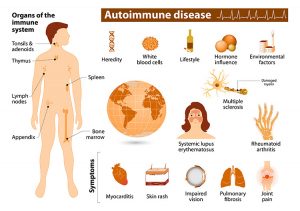Breast cancer prognosis is especially poor in patients with low serum selenium and serum selenoprotein P concentrations. Now, researchers have discovered natural autoantibodies with antagonistic properties to selenoprotein P uptake in breast cancer patients and in patients with thyroid disease [Demircan 2022; Sun 2022].

Selenium is an essential trace element that has numerous biological functions in the body, most of which are carried out by selenium-containing selenoproteins. Among the more important selenoproteins are selenoprotein P, the main transporter of selenium in the blood, and glutathione peroxidase 3 (GPX3), an important antioxidant.
The human body does not synthesize selenium. Human cells are dependent upon selenium sources in the diet. Unfortunately, the selenium content in the soil and in food varies considerably from region to region in the world. For example, the plasma selenium concentrations in people living in much of Europe are generally below, often well below, 80–90 mcg/L whereas people living in North America generally have plasma selenium levels above 120 mcg/L [Alehagen 2022].
Optimal Selenium Intakes and Status
Selenium research indicates that a selenium intake of 100-150 mcg daily is necessary to achieve an optimal expression of selenoprotein P. For the cells to realize an optimized expression of the selenoproteins, humans need a daily intake of selenium that yields a selenium concentration of approximately 120 mcg/L, measured in red blood cells [Alehagen 2022].
Autoimmunity to Selenoprotein P Impairs Selenium Transport
In two separate papers published in 2022, selenium researchers have reported finding evidence of autoimmunity to selenoprotein P in 6-7% of breast cancer patients [Demircan 2022] and in 6-7% Hashimoto’s thyroiditis patients [Sun 2022].
In both cases, elevated concentrations of the selenoprotein P autoantibodies were associated with a worse disease prognosis [Demircan 2022; Sun 2022]. The researchers reported a disrupting effect of the selenoprotein P autoantibodies on the normal transport and homeostasis of selenium.
Selenoprotein P Autoantibodies Predict Recurrence of Breast Cancer
Even after the researchers adjusted for potential confounders of breast cancer prognosis, they found a significant effect of the concentration of selenoprotein P autoantibodies on breast cancer recurrence and mortality [Demircan 2022].
The researchers concluded that the measurement and evaluation of selenoprotein P autoantibodies can identify patients at high risk for breast cancer recurrence, independently of other commonly used prognostic factors. Breast cancer patients who were selenoprotein P autoantibody-positive had a poor prognosis [Demircan 2022].
The researchers made the following points about selenoprotein P autoimmunity [Demircan 2022]:
- Their study shows that there is a higher expectation of selenoprotein P autoimmunity in patients with a higher age.
- The selenoprotein P autoantibodies were associated in a dose-dependent manner with higher circulating selenium and selenoprotein P without a corresponding increase rise in GPX3 activity, indicating that the selenoprotein P autoantibodies have an antagonistic effect on selenium uptake.
- The effect of the selenoprotein P autoantibodies was not related to any tumor characteristics, only to the age of the breast cancer patients at diagnosis.
- The best explanation is that the selenoprotein P autoantibodies bind with selenoprotein P and inhibit its uptake in a dose-dependent manner.
Selenium Biomarkers and Breast Cancer Prognosis Techniques
The researchers noted that the concentration of selenoprotein P autoantibodies is useful for breast cancer prognosis in the same way that the concentration of serum selenium concentrations, serum selenoprotein P concentrations, and serum GPX3 concentrations do [Demircan 2022].
The currently used prognostic techniques for breast cancer patients mostly
require invasive methods and sampling of tumor tissue. Accordingly, assessment of selenoprotein P autoantibody concentrations represents a promising serum biomarker that would not be cost-intensive or labor-intensive [Demircan 2022].
Conclusion: Breast Cancer and Selenium Supplementation
Demircan et al [2022] suggest that their breast cancer findings may be of special relevance to women (and men) with insufficient dietary selenium intakes. Natural autoantibodies to Selenoprotein P impair selenium transport and negatively affect GPX3 biosynthesis.
Sun et al [2022] suggest that a score combining conventional selenium status biomarkers with an assessment of serum selenoprotein P autoantibody concentration may be better for judging the patients’ need for selenium supplementation than assessments of serum selenium or serum selenoprotein P alone.
What is needed now is a randomized controlled study to test the potential benefit of selenium supplementation for correcting low selenium status and deficit and for improving poor disease prognosis [Demircan 2022].
Sources
Alehagen U, Johansson P, Svensson E, Aaseth J, Alexander J. Improved cardiovascular health by supplementation with selenium and coenzyme Q10: applying structural equation modelling (SEM) to clinical outcomes and biomarkers to explore underlying mechanisms in a prospective randomized double-blind placebo-controlled intervention project in Sweden. Eur J Nutr. 2022 Apr 6. Epub ahead of print.
Demircan K, Sun Q, Bengtsson Y, SeemannR , Vallon-Christersson J, Malmberg M, Saal LH, Rydén L, Minich WB , Borg Å, Manjer J, Schomburg L. Autoimmunity to selenoprotein P predicts breast cancer recurrence.
Redox Biology. 2022;53:102346.
Sun Q, Mehl S, Renko K, et al. Natural autoimmunity to Selenoprotein P impairs selenium transport in Hashimoto’s Thyroiditis. Int J Mol Sci. 2021;22(23):13088.
The information presented in this review article is not intended as medical advice and should not be used as such.
15 August 2022
